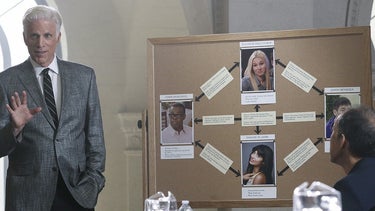
Please join us this Monday, Oct. 18th from 4:30 to 5:30pm to discuss the final episodes (10-13) of The Good Place, Season 1. We’ll meet in the Strange Lounge of Main Hall, unless it’s nice out, in which case we’ll likely be at the picnic tables in front of the building.
Episode 10 “Chidi’s Choice” Everyone is bonding: Jason and Janet get hitched, Real Eleanor loves Chidi, Fake Eleanor loves Chidi, Chidi loves Tahani (according to Tahani), Eleanor and Tahani have a weird forked-up friendship, maybe Jason is Eleanor’s soulmate? Chidi remains undecided. We’ll discuss the conditions for love (romantic and friendship), and whether failing to decide is a type of decision.
Episode 11 “What’s my Motivation” So far on The Good Place, getting to the Good Place is all about the consequences of one’s actions when on Earth. However, this episode highlights the importance of motivations and intentions as Eleanor tries to justify her spot in the Good Place. Jason and Janet’s love blossoms:
Michael : You two are married?
Jason Mendoza : Hells yeah, homie. We love each other.
Jason Mendoza : She makes the bass drop… in my heart.
Janet : And Jason is a person who was near me, and then he asked me to marry him, and there is nothing in my protocol that specifically barred that from happening. So I agreed.
Jason Mendoza : Love you too, babe.
And later:
Janet : Jason, you are all that I care about, possibly because I did not have the capacity to care about anything before you. I love you.
**Spoilers** Episode 12 “Mindy St. Claire” There’s a medium place, and a bad place…
Eleanor: It took me a while to figure it out, but just now as we were all fighting and yelling at each other and each one of us demanding we should go to the Bad Place, I thought to myself, “Man, this is torture.”
Episode 13 “Michael’s Gambit” In Sartre’s play No Exit one of the characters claims “Hell is other people.” We’ll discuss Michael’s gambit and the extent to which hell is other people (on The Good Place). In Sartre on Theatre Sartre explains:
. . .“hell is other people” has always been misunderstood. It has been thought that what I meant by that was that our relations with other people are always poisoned, that they are invariably hellish relations. But what I really mean is something totally different. I mean that if relations with someone else are twisted, vitiated, then that other person can only be hell. Why? Because. . . when we think about ourselves, when we try to know ourselves, . . . we use the knowledge of us which other people already have. We judge ourselves with the means other people have and have given us for judging ourselves. Into whatever I say about myself someone else’s judgment always enters. Into whatever I feel within myself someone else’s judgment enters. . . . But that does not at all mean that one cannot have relations with other people. It simply brings out the capital importance of all other people for each one of us.
